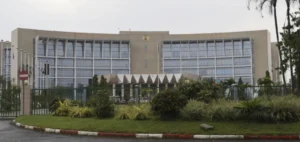Russian oil giant Lukoil is in negotiations to sell its refinery in Priolo, Sicily, and these discussions could be concluded by the end of the year, said the head of the industrial site, Eugene Maniakhine.
The nationalist government led by Giorgia Meloni had decided on Thursday to put the refinery under “provisional administration” of the state to avoid its closure and ensure the continuity of national energy supply.
The Lukoil-controlled ISAB refinery, one of the largest in Europe, was in danger of having to stop production because of the European Union’s embargo on the import of Russian crude oil by sea, which came into effect on December 5.
“We believe that the sale agreement can be concluded in record time, probably within the current year,” Maniakhine said in an interview with the business daily Il Sole 24 Ore.
According to the Financial Times, Lukoil is negotiating an agreement with the American investment fund Crossbridge Energy Partners for a purchase of the refinery, which is estimated to be worth between 1 and 1.5 billion euros.
Despite the fact that the EU embargo on the import of Russian oil by sea came into force on Monday, “the refinery is fully prepared to operate without interruption in these new market conditions,” Maniakhine assured.
In the absence of a risk of stopping production, he considered it “neither fair nor useful” for the government to implement its decision and appoint a state commissioner to manage the refinery.
Such a move could “contribute to the closure of the plant and create obstacles to the sale to the new owner,” Maniakhine warned.
“For us, the operation of a refinery does not fall under the jurisdiction of the state,” he added.
The Italian Minister of Enterprise, Adolfo Urso, had said on Saturday that “the government assumes the responsibility of carrying out an extraordinary temporary administration, also involving an oil company” which could be Eni, in order to “guarantee the continuity of the
production”.
The ISAB refinery, one of the largest in Europe, has an annual refining capacity of ten million tons of crude oil, which can reach up to 14 million tons and supplies more than 20% of the national needs.
“Our crude reserves are sufficient to keep the refinery running for several months,” said Maniakhine, ISAB’s general director.
As for the embargo on Russian oil, “it is not a problem for us to provide a sufficient amount of non-Russian crude for ISAB,” he assured.






















